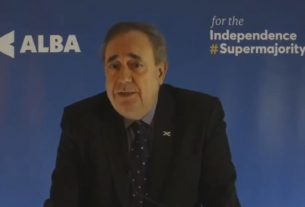Nicola Sturgeon has unveiled plans for a Scottish independence referendum on October 19, 2023 and has referred herself to the UK’s highest court in an attempt to force the vote.
Scotland’s first minister said her legal officer has been instructed to refer legislation for a “consultative” referendum to the UK Supreme Court in order to determine if her devolved government has the authority to hold such a vote.
Setting out her plans, Sturgeon stressed that any referendum needs to be “indisputably lawful” and constitutional and a court decision will ensure the vote is credible and internationally recognised.
Sturgeon takes ‘monumental risk’ for Scottish independence referendum
Under the headline, ‘Nicola Sturgeon abandons caution to gamble all’, the Times reports that some SNP members believe the first minister is taking “a monumental risk” in referring her plan to the Supreme Court. Lose, and the independence cause could “potentially” be consigned “to oblivion for decades”.
Pro-independence parties – the SNP, Alba and the Green party – won 50.12% of the vote in last year’s Holyrood election. Following an historic landslide victory for the SNP – with the party securing the highest number of votes, highest number of constituency seats and the highest vote share ever in a Scottish election – Sturgeon immediately pledged to hold a referendum on independence.
Prime minister Boris Johnson remains adamantly opposed to another Scottish independence referendum, stating the 2014 vote was a “once-in-a-lifetime” referendum on Scotland’s place in the union.
However, proponents of Scottish independence point out that everything has changed immeasuarbly post-Brexit. In 2014 Scotland’s place in the union of the UK means it was also part of the European Union. Brexit – the result of the 2016 EU referendum – took the whole of the UK out of the EU, despite Scotland (and Northern Ireland) voting to remain.
Pro-Union parties – the Conservatives, Labour and the Liberal Democrats – have vowed to boycott any ballot on independence not endorsed by the UK government. Foreseeing this question of legitimacy, Sturgeon has promised to make the next general election a one-issue-election that will force unionist parties to partake in the campaign.
The spectre of the SNP in Downing Street as part of a Labour led coalition, has been used effectively by the Conservatives in the last three general elections, meaning Sir Keir Starmer’s ambitions for Number 10 could be thwarted by Sturgeon’s gambit.
Johnson said yesterday (June 28) his government’s position has not changed and repeated that “now is not the time” for another referendum. The UK government has given short shrift to Strugeon’s Supreme Court bid, saying it is “clear” the constitution is reserved for Westminster.
“We’ll study it very carefully and respond properly,” Johnson said. “I think the focus of the country should be building a stronger economy. That’s what we’re doing. I certainly think that we’ll have a stronger economy and a stronger country together.”
Sturgeon told MSPs at Holyrood that Scotland’s top law officer, the Lord Advocate, has referred the bid to hold a Scottish independence referendum to the UK Supreme Court, the highest in the land. Court papers were served to the UK government’s law officers on Tuesday (June 28).
Sturgeon said she hopes the court will “deliver clarity and legal standing in a timely manner”. If the Supreme Court rules that the Scottish parliament does not have the power to hold a referendum, Sturgeon pledged to make the next general election campaign a “de facto referendum” with her SNP party standing on the single issue of independence.
If the court approves the Scottish government’s plan for an independence vote in 2024, the first minister said Holyrood would move to quickly pass the Referendum Bill, which was published yesterday.
The question in the referendum will be the same as in 2014 – “Should Scotland be an independent country?”
“Scotland will have its say on independence,” Sturgeon told MSPs. “I want the process set in train today to lead to a lawful, constitutional referendum.”




